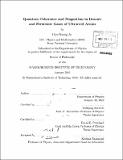Quantum coherence and magnetism in bosonic and fermionic gases of ultracold atoms
Author(s)
Jo, Gyu-Boong
DownloadFull printable version (25.82Mb)
Other Contributors
Massachusetts Institute of Technology. Dept. of Physics.
Advisor
Wolfgang Ketterle and David E. Pritchard.
Terms of use
Metadata
Show full item recordAbstract
In this thesis, two sets of experimental studies in bosonic and fermionic gases are described. In the first part of the thesis, itinerant ferromagnetism was studied in a strongly interacting Fermi gas of ultracold atoms. The observation of nonmonotonic behavior of lifetime, kinetic energy, and size for increasing repulsive interactions provides strong evidence for a phase transition to a ferromagnetic state. Our observations imply that itinerant ferromagnetism of delocalized fermions is possible without lattice and band structure, and our data validate the most basic model for ferromagnetism introduced by Stoner. In the second part of the thesis, the coherence properties of a Bose-Einstein condensate (BEC) was studied in a radio frequency induced double-well potential implemented on a microfabricated atom chip. We observed phase coherence between the separated condensates for times up to 200 ms after splitting, a factor of 10 longer than the phase diffusion time expected for a coherent state for our experimental conditions. The enhanced coherence time is attributed to number squeezing of the initial state by a factor of 10. Furthermore, the effect of phase fluctuations on an atom interferometer was studied in an elongated BEC. We demonstrated that the atom interferometer using the condensates is robust against phase fluctuations; i.e., the relative phase of the split condensates is reproducible despite axial phase fluctuations. Finally, phase-sensitive recombination of two BECs was demonstrated on an atom chip. The recombination was shown to result in heating, caused by the dissipation of dark solitons, which depends on the relative phase of the two condensates. This heating reduces the number of condensate atoms and provides a robust way to read out the phase.
Description
Thesis (Ph. D.)--Massachusetts Institute of Technology, Dept. of Physics, 2010. Cataloged from PDF version of thesis. Includes bibliographical references (p. 168-185).
Date issued
2010Department
Massachusetts Institute of Technology. Department of PhysicsPublisher
Massachusetts Institute of Technology
Keywords
Physics.